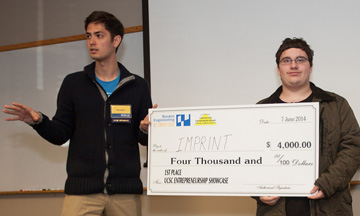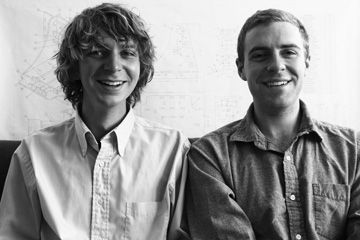Campus News
Student entrepreneurs pitch business ideas developed at UC Santa Cruz
The Entrepreneurship Showcase in Silicon Valley featured cash prizes, networking, and real-world business challenges for students.


UC Santa Cruz undergraduate and graduate students presented prototypes and business plans to alumni and venture capitalists during an Entrepreneurship Showcase on Saturday, June 7, at the UCSC Silicon Valley Center in Santa Clara. Many of the students developed their ideas during courses sponsored by UCSC’s Center for Entrepreneurship.
The $4,000 top prize went to the Imprint team of Mark Adams and Brian Vallelunga. Their software product can be embedded in a website to monitor the site’s performance. If there are problems, the Imprint software asks the user for more information and notifies the site’s webmaster. The goal is to improve customer satisfaction and avoid lost sales due to webpage issues. The students plan to use the prize money to launch their company.
Makesmith CNC won the $3,000 second place award. Bar Smith, an electrical engineering student graduating in June, and history alumnus Tom Beckett developed a low-cost desktop computer-controlled router for tinkerers and hobbyists. A Kickstarter campaign to produce the router kits closed on June 9th after raising more than $80,000.
TaskMapp, an application that uses Google Maps to display the most efficient route for running errands, won third place ($2,000) and the $1,000 People’s Choice award based on votes from attendees. Andrew Everett and Jonathan Schalf developed the mobile app.
“Getting out in front of people, pitching your work, and making a good impression is hard to do,” said Brent Haddad, director of the Center for Entrepreneurship and associate dean for technology management in the Baskin School of Engineering. “They’ve been practicing and working up to that, and we’re giving them a great venue to build those communication and leadership qualities.”
15 minutes
Sixteen groups competed for a chance to present at showcase, but only a few advanced to public presentations on Saturday. “It’s odd: two quarters of work and it all comes down to 15 minutes,” said John Skardon, a lecturer in technology and information management who managed the student teams for the showcase. “Welcome to the startup world.”
Skardon, an engineer-turned-entrepreneur, developed a two-course series in entrepreneurship this year for UCSC students with business ideas, regardless of their background or major. His goal was to teach students fundamental concepts that all entrepreneurs should know.
Students entered the first course with an idea they thought could be a good business. Throughout the winter quarter, they learned key concepts in a business model, including customers, suppliers, and distribution channels. Then the students applied those concepts to their ideas. By the end of the quarter, Skardon says, some students had realized their ideas wouldn’t work. Others realized they’d identified the wrong customer or market, giving them an opportunity to strengthen their ideas.
Students continuing in Skardon’s classes brought their completed business model to the second course, which started in April. Skardon then challenged them to test the claims of each component of their business model. “Until students have to put themselves on the line, they don’t learn it,” he said.
A team of two students, one studying business marketing and the other electrical engineering, recently attended an anime conference in San Francisco to test their idea on a target market of independent artists. The students want to connect graphic artists with small- to medium-sized businesses looking to get art, a logo, or a jingle produced. The students asked 30 to 40 artists at the conference if they would subscribe to such a service, and Skardon said the students think there is a market for their business. Now they’re developing a pricing plan, which they’ll have to test by talking to artists and business owners.
Effective teams
Many students work in teams, Skardon said, and he’s found that the teams are most effective when they link a student studying the creative side of business, like marketing, with an engineer. “If you bring those two together early on, good things happen,” he said.
Other students develop their business plans independently. An exchange student from Korea wants to create a line of high-quality, Korean-made children’s clothes to address the high markup on imported clothes. Skardon said the student has figured out that only some aspects of the business, namely design, assembly and marketing, should be based in Korea because denim and fabric can be sourced from other countries. The student has also learned that the fashion industry involves more software than he expected, as machines often have to be changed to produce new designs within weeks or months.
“All businesses have different contexts,” Skardon said. “If you try to apply a formula to any of these things, you’ll fail.”
Eight of the groups who attended the showcase came from Skardon’s course. Area entrepreneurs coached students on their pre-showcase presentations for the judges. Those not selected to present at the public showcase demonstrated their prototypes or brought brochures explaining their business.
Alumni and local entrepreneurs were invited to attend the event, and many came looking for new ideas and talent, Skardon said. It’s also a fun event for alumni to network and reconnect with friends, Haddad added.
Skardon said there is a strong movement in Santa Cruz and at UCSC to encourage entrepreneurship in Santa Cruz County. He encourages students eager to pursue their ideas after the courses end to present at local networking events. Skardon started his first company by giving a short talk at a monthly get-together in Portland, Oregon, organized by the local business community. That event lead to more formal presentations and eventually to the company’s first round of funding.
The Entrepreneurship Showcase was sponsored by the UCSC Center for Entrepreneurship, the Baskin Alumni Advisory Council, the Technology Management Department, the UC Santa Cruz Foundation, and the UCSC Office of Research.